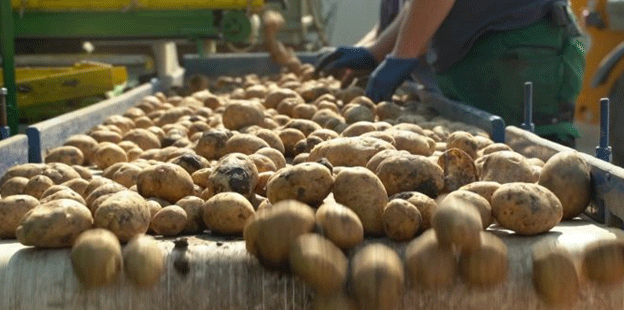For centuries, the Oderbruch region in eastern Germany was known for its potato cultivation, a tradition that dates back to the 18th century when Frederick the Great ordered the planting of potatoes to combat famine. However, in the 1990s, potato farming vanished from the Oderbruch as farmers abandoned the practice due to the challenging, muddy soil conditions. Today, farmer Lutz Wercham is bringing this tradition back to life.
On his fields in Neutrebbin and Letschin in Märkisch-Oderland, Wercham has planted 50 hectares of potatoes. His crop of choice, the “Mia” variety, is a smooth-skinned, yellow-fleshed table potato—a familiar sight on German dinner tables. But growing potatoes in Oderbruch’s heavy, muddy soil is no easy task.
The Challenges of Muddy Soils
The clay-heavy soils of the Oderbruch are notorious for making farming difficult. The dense mud clumps together, making mechanical harvesting a challenge. “It’s very difficult to separate the clumps of soil from the potatoes with machines,” Wercham explains. This is one of the primary reasons potato farming disappeared from the region in the first place. Despite advances in farming technology, Wercham and his team still have to manually separate the clumps of mud from the potatoes during harvesting, a labor-intensive process.
Despite these challenges, Wercham’s daily harvest yields between 50 and 75 tons of potatoes, which are carefully sorted on his farm before being transported to a wholesaler in Treuenbrietzen. From there, the potatoes make their way to supermarkets, although Wercham also sells directly to consumers through his small farm shop.
A Return to Tradition with a Modern Twist
Wercham’s decision to revive potato farming in Oderbruch isn’t just about honoring tradition—it’s also a strategic move to diversify his farm’s income. Originally focused on growing herbs, flowers, and grasses for seeds, Wercham found that the seed business was no longer profitable. Potatoes offered a viable alternative, despite the significant investment in machinery and labor required to work the challenging soil.
Henrik Wenndorff, president of the Brandenburg Farmers’ Association, praises Wercham’s efforts: “Ensuring quality and stable yields in such a challenging environment is no small task. Hats off to those who take on the challenge of reviving this old—but new—enterprise.”
Wercham is committed to continuing potato farming for at least another two years. “I’ve invested a lot in this venture, and the machines aren’t all paid off yet. We have to keep going. I’m placing a lot of hope in this crop,” Wercham says. He views the Oderbruch potato not as a temporary experiment but as a long-term commitment to revitalizing a piece of the region’s agricultural heritage.







